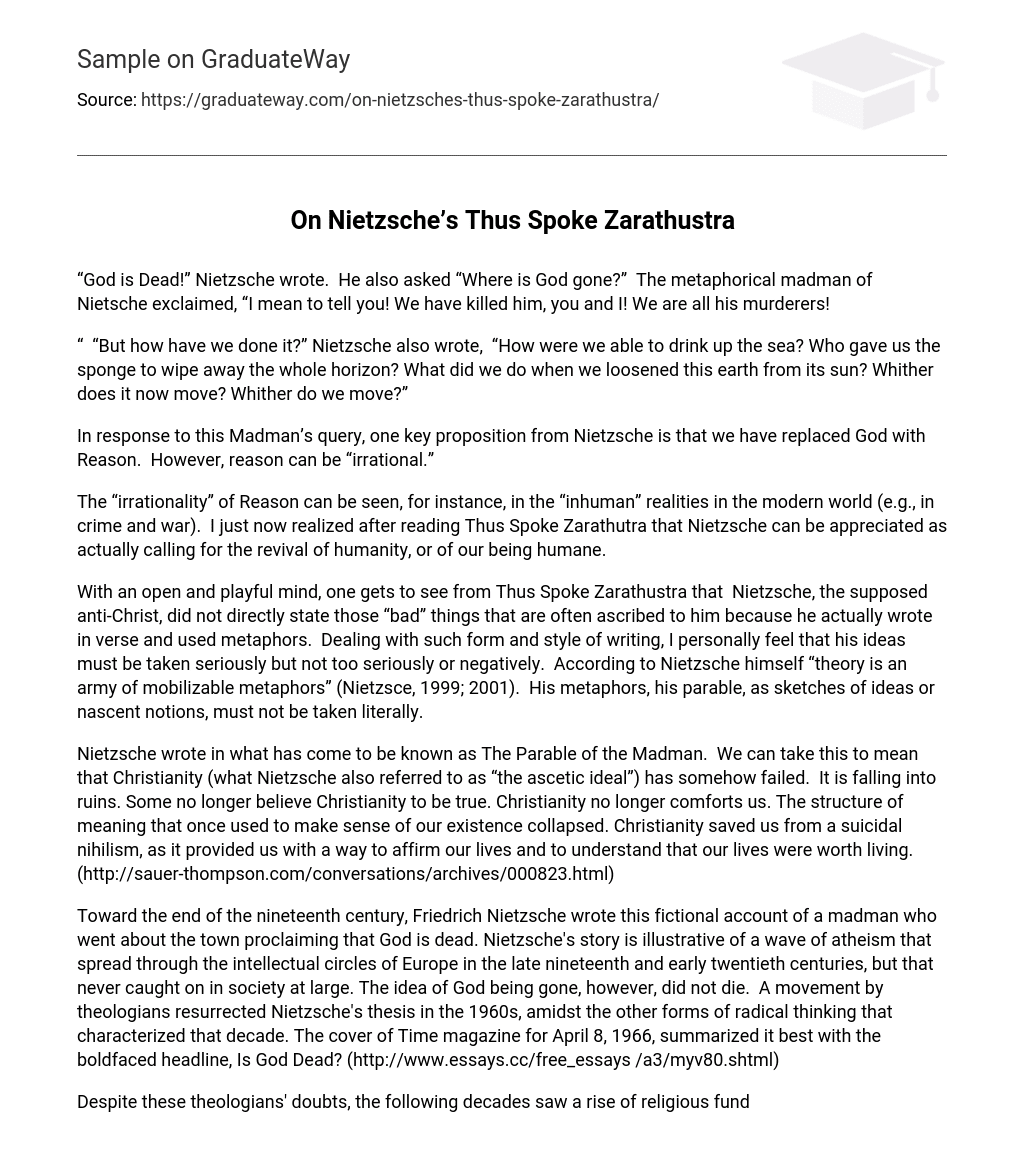“God is Dead!” Nietzsche wrote. He also asked “Where is God gone?” The metaphorical madman of Nietsche exclaimed, “I mean to tell you! We have killed him, you and I! We are all his murderers!
“ “But how have we done it?” Nietzsche also wrote, “How were we able to drink up the sea? Who gave us the sponge to wipe away the whole horizon? What did we do when we loosened this earth from its sun? Whither does it now move? Whither do we move?”
In response to this Madman’s query, one key proposition from Nietzsche is that we have replaced God with Reason. However, reason can be “irrational.”
The “irrationality” of Reason can be seen, for instance, in the “inhuman” realities in the modern world (e.g., in crime and war). I just now realized after reading Thus Spoke Zarathutra that Nietzsche can be appreciated as actually calling for the revival of humanity, or of our being humane.
With an open and playful mind, one gets to see from Thus Spoke Zarathustra that Nietzsche, the supposed anti-Christ, did not directly state those “bad” things that are often ascribed to him because he actually wrote in verse and used metaphors. Dealing with such form and style of writing, I personally feel that his ideas must be taken seriously but not too seriously or negatively. According to Nietzsche himself “theory is an army of mobilizable metaphors” (Nietzsce, 1999; 2001). His metaphors, his parable, as sketches of ideas or nascent notions, must not be taken literally.
Nietzsche wrote in what has come to be known as The Parable of the Madman. We can take this to mean that Christianity (what Nietzsche also referred to as “the ascetic ideal”) has somehow failed. It is falling into ruins. Some no longer believe Christianity to be true. Christianity no longer comforts us. The structure of meaning that once used to make sense of our existence collapsed. Christianity saved us from a suicidal nihilism, as it provided us with a way to affirm our lives and to understand that our lives were worth living. (http://sauer-thompson.com/conversations/archives/000823.html)
Toward the end of the nineteenth century, Friedrich Nietzsche wrote this fictional account of a madman who went about the town proclaiming that God is dead. Nietzsche’s story is illustrative of a wave of atheism that spread through the intellectual circles of Europe in the late nineteenth and early twentieth centuries, but that never caught on in society at large. The idea of God being gone, however, did not die. A movement by theologians resurrected Nietzsche’s thesis in the 1960s, amidst the other forms of radical thinking that characterized that decade. The cover of Time magazine for April 8, 1966, summarized it best with the boldfaced headline, Is God Dead? (http://www.essays.cc/free_essays /a3/myv80.shtml)
Despite these theologians’ doubts, the following decades saw a rise of religious fundamentalism among many Christians and Muslims and a return to traditionalist thinking among many Jews. Today, many still say they believe in God. If he were to appear today, Nietzsche’s madman would still find that he had come too early. What is the future of God? Will He ever truly “die”? One difficulty in answering these questions is the word God. It may seem like a simple word, but God doesn’t mean the same thing to everybody: Various images and ideas of the deity appear throughout different times and cultures. We need to study the way people have understood God in the past and what they believe today. Then we can address what concept of God is emerging for future believers. (Ibid.)
References
Nietzsche, F. “Über Wahrheit und Lüge im außermoralischen Sinne,” in Kritische Studienausgabe, Vol. 1, eds. Giorgio Colli and Mazzino Montinari (Munich and Berlin: DTV and de Gruyter, 1999), 873-890, here 880; as cited in Journal of American Studies of Turkey, 14 (2001): 35-50, “Enduring Freedom: War, Corporate Television, and the Delusion of the Delusion” by Gerhard Richter in http://www.bilkent. edu.tr/~jast/Number14/Gerhard.htm#_ftn1
http://www.essays. cc/free_essays/a3/myv80.shtml
http://sauer-thompson.com/conversations/archives/000823.html





